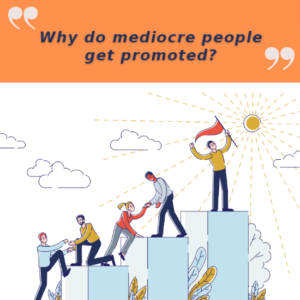Have you ever wondered “Why them?” when you see someone get promoted?
Well, sometimes it’s not about skills or hard work; it’s about managers trying to pass on problem employees. Instead of tackling issues, some bosses take the easy way out – promote the headache to someone else’s team.
But here’s the thing – leadership isn’t about taking the easy road. It’s about doing what’s best for everyone, even when it’s uncomfortable. Promoting problem employees is short-sighted; it just spreads the trouble instead of fixing it.
Leaders need to step up and tackle issues head-on. Avoiding tough conversations only hurts the team and the organisation in the long run. Promotions should be earned, not used as an escape hatch for managers.
Let’s create workplaces where people are recognized for their contributions and where leaders aren’t afraid to deal with challenges. It’s time for leaders to step up, have those hard conversations, and lead by example. That’s how we build strong teams and thriving organisations.
____
I help leaders master Positive Friction so that they can use constructive conflict and negotiation skills to be more effective. If this post resonates, get in touch.

